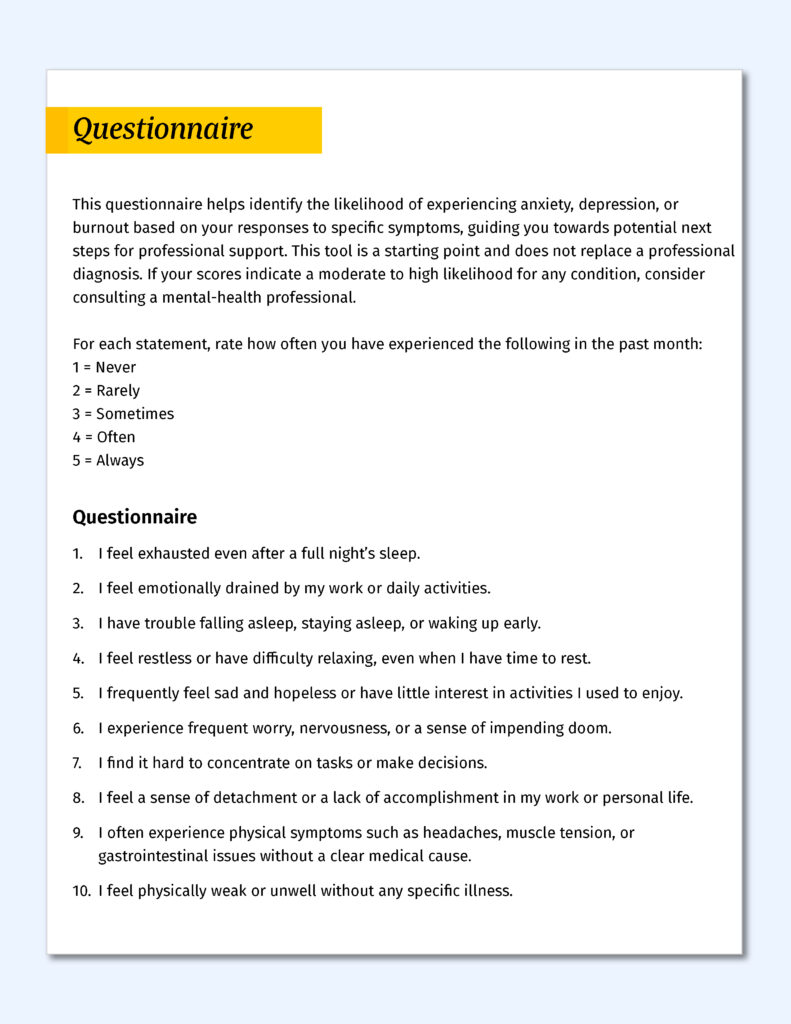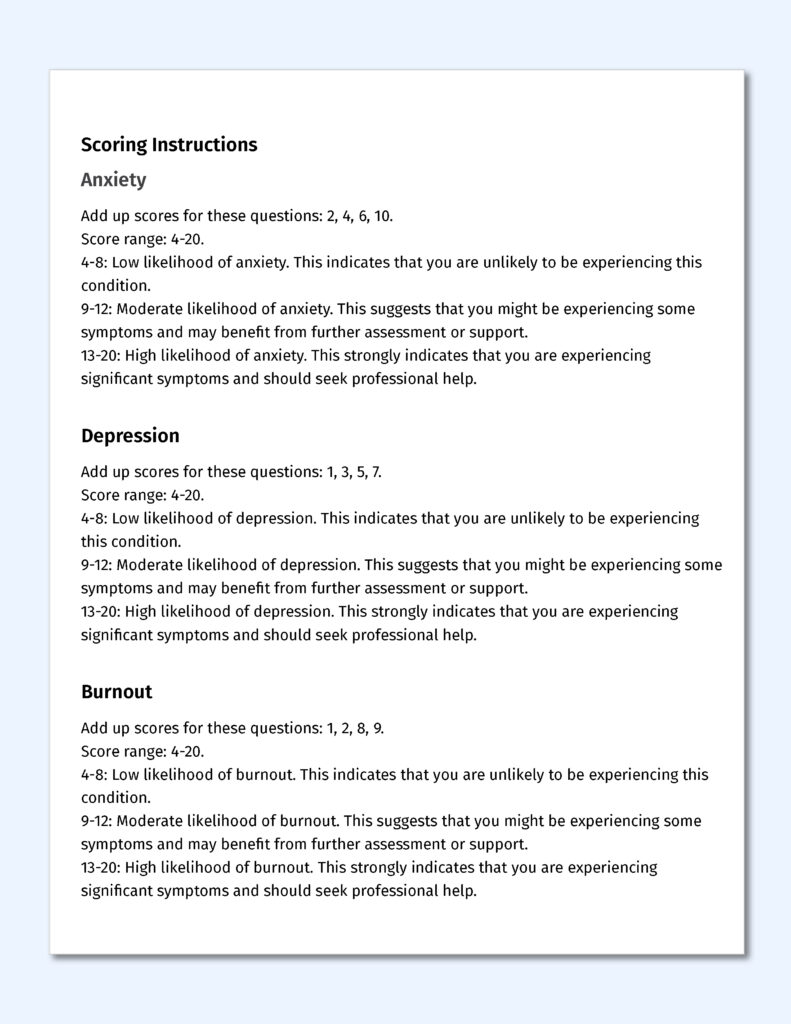
In the world of mental health, distinguishing between anxiety, depression, and burnout can feel like trying to navigate through turbulent skies without a clear flight plan. Despite being distinct conditions, they often share commonalities, such as fatigue and loss of interest. Understanding their subtle differences is crucial for finding the right support and making positive changes. This article explores the nuances that set these mental-health conditions apart, offering insight into their unique traits and potential impact on your overall well-being.
Anxiety, depression, and burnout share various common symptoms like fatigue, sleep disturbances, and concentration issues. Each person experiences these conditions differently, making precise categorization even more challenging. Moreover, societal stigmas and misunderstandings often stand in the way of recognizing and seeking treatment for these issues. External factors such as work stress and personal circumstances further complicate matters, influencing how symptoms are perceived and labeled. Ongoing research also continually updates diagnostic criteria, contributing to more confusion.
This article clarifies the differences between anxiety, depression, and burnout by breaking down their unique characteristics and how they impact mental health. Clear explanations are provided to demystify these conditions and offer guidance for identifying them in yourself or others. A self-test is included at the end of the article to help you reflect on symptoms, gain insight into which condition might be present, and empower you to seek the right support and make informed decisions about your mental health.
1. Anxiety
Anxiety is a common emotion. It is a general feeling of unease, worry, or apprehension in response to stressful situations or perceived threats. Anxiety can be helpful in some situations, such as motivating us to prepare for challenges. However, persistent or excessive anxiety can become a problem that interferes with daily functioning. It often manifests in various forms and degrees of intensity, ranging from mild nervousness to overwhelming panic. Anxiety is frequently triggered by specific situations, such as social events, work deadlines, or personal conflicts, or it may arise without any apparent cause, known as generalized anxiety disorder (GAD).
Symptoms
Anxiety is often related to various physical symptoms, which can include increased heart rate, shortness of breath, dizziness, and gastrointestinal issues. These sensations are part of the body's natural fight-or-flight response, preparing you to deal with perceived threats. Anxiety often involves psychological symptoms as well. You may find yourself feeling tense, on edge, or irritable. Your mind may race with worries or catastrophic thoughts about the future, which can also cause sleep disturbances.
Note: Anxiety and stress are frequently confused because they share similar physical and emotional symptoms. However, stress is a reaction to specific events that often go away once the stressor is removed or the situation improves. Anxiety can manifest without an apparent cause and may persist over time.
Preventing Anxiety
Lifestyle changes, such as regular exercise, healthy eating, stress management techniques, and relaxation exercises, can help manage anxiety. When experiencing anxiety, it is essential to reach out for support from loved ones or a mental-health professional and to seek treatment if symptoms are interfering with daily life.
2. Burnout
Burnout is a significantly diminished energy affecting various aspects of life, including work, relationships, and other interests. Burnout is often linked to work-related stress, particularly in demanding professions with high levels of responsibility, pressure to perform, and long working hours. Burnout is characterized by the feeling of exhaustion, both physical and emotional, a lack of motivation, feeling overwhelmed, detachment from work and responsibilities, and often a sense of cynicism or pessimism. Burnout does not happen overnight; it develops gradually over time as a result of chronic stress. Tasks that used to feel manageable now seem overwhelming. You may be constantly tired, even after a whole night's sleep. You can feel emotionally distant from your colleagues, friends, and family. Tasks that once were meaningful now feel unfulfilling. In addition to exhaustion and detachment, burnout often involves a reduced sense of accomplishment or efficacy. This can erode your self-confidence and lead to feelings of inadequacy or worthlessness. These combined can lead to apathy or disengagement, further contributing to the burnout cycle.
Symptoms
Signs of burnout may include irritability, difficulty sleeping, and physical symptoms like headaches or gastrointestinal issues. If left unaddressed, burnout can have severe consequences for both physical and mental health, including increased risk of depression, anxiety, and cardiovascular disease.
Preventing Burnout
Fortunately, burnout is not inevitable, and there are steps you can take to prevent or address it. Self-care practices like regular exercise, healthy eating, and adequate sleep can help replenish your energy reserves. Setting boundaries and prioritizing tasks can also help manage stress and prevent burnout. Additionally, seeking support from friends, family, or mental health professionals can provide valuable perspective and assistance in navigating burnout.
3. Depression
Depression is characterized by feelings of sadness, hopelessness, and a lack of interest or pleasure in activities once enjoyed. Imagine waking up daily feeling trapped in a dark place, unable to find joy in anything. That is how various people with depression have described their experiences.
Depression is often misunderstood as being sad or down, but it is more intense than that. It is a sense of despair that can linger for weeks, months, or even years if left untreated. It can affect mood, cognition, behavior, and physical health. There are usually a variety of things that contribute to depression. Biological factors, such as genetics, brain chemistry, and hormonal imbalances, play a significant role. Additionally, life experiences such as trauma, loss, or abuse can contribute to the development of depression.
Symptoms
Common signs of depression can include persistent feelings of sadness, hopelessness or emptiness, losing interest or joy in things previously enjoyed, changes in appetite or weight, sleep disturbances, fatigue or loss of energy, feelings of worthlessness or guilt, difficulty making decisions, and having dark thoughts.
Note: Experiencing some of these symptoms from time to time does not necessarily mean you have depression. However, if these symptoms persist for two weeks or more and interfere with your daily functioning, it may be a sign of depression.
Preventing Depression
Seeking help for depression is crucial, as it is a treatable condition. The first step is to consult with a healthcare professional, such as a doctor or therapist. With depression, it is crucial to address any underlying issues, such as trauma or chronic stress, and to seek help if you notice symptoms of depression emerging. In addition to helping with depression, support from loved ones can be incredibly valuable. Talking openly about your feelings and experiences with people you trust can help reduce feelings of isolation and provide a sense of connection and understanding. Finally, regular exercise, healthy eating, adequate sleep, and stress management techniques can all help improve mood.
Quick Overview: The Differences
Understanding the distinctions between anxiety, stress, burnout, and depression is crucial for effective management and alleviation of symptoms.
Nature of Symptoms
- Anxiety is characterized by persistent worry and fear, often accompanied by physical symptoms like rapid heartbeat and sweating.
- Burnout primarily involves emotional exhaustion and detachment from work responsibilities due to prolonged stress.
- Depression entails persistent feelings of sadness, hopelessness, and loss of interest or pleasure in activities once enjoyed.
Triggers and Context
- Anxiety typically arises in response to perceived threats or stressful situations.
- Burnout is closely linked to prolonged work-related stress.
- Depression can stem from various factors, including biological predisposition, traumatic experiences, or chronic stress, and may not always have a clear trigger.
Impact on Functioning
- Anxiety may lead to avoidance of certain situations or activities, affecting productivity.
- Burnout often results in reduced engagement and effectiveness at work.
- Depression can have a significant impact on various areas of life, including relationships, work, and physical health, often causing social and occupational impairment.
Solutions Overlap
Despite their differences, solutions for all three conditions often overlap. Seeking professional help, building a support network, adopting healthy lifestyle habits, and practicing stress-management techniques are crucial. Moreover, exercise plays a vital role in alleviating symptoms by promoting the release of endorphins, neurotransmitters that boost mood and reduce stress.
Questionnaire
This questionnaire helps identify the likelihood of experiencing anxiety, depression, or burnout based on your responses to specific symptoms, guiding you towards potential next steps for professional support. This tool is a starting point and does not replace a professional diagnosis. If your scores indicate a moderate to high likelihood for any condition, consider consulting a mental-health professional.


Download Printer Friendly Questionnaire
Final Thoughts
Anxiety, burnout, and depression affect millions of people worldwide, impacting their work, relationships, and quality of life. However, with the proper support and resources, you can find relief and regain control of your mental health. If you recognize symptoms that interfere with your day-to-day activities, seek help from a mental-health professional for an evaluation and fitting treatment.
Emerald Mental Health addresses these complaints through specialized programs and support by offering counseling, coaching, and resources to help pilots navigate their challenges and maintain optimal mental fitness. Schedule a free consultation via email at reini@emeraldmentalhealth.com or visit www.emeraldmentalhealth.com.



















































































































